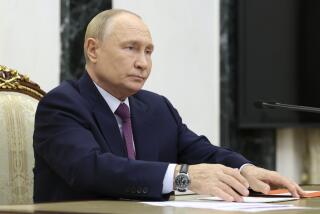Gorbachev Proposes ‘Double-Zero Option’: Asia as Well as Europe
MOSCOW — Soviet leader Mikhail S. Gorbachev said today he is ready to accept a “double-zero option” eliminating Soviet and U.S. medium-range missiles from Europe and Asia, the official Tass press agency reported.
Analysts said the offer, made in an interview with an Indonesian newspaper editor, appeared to eliminate a key obstacle in current negotiations between the superpowers in Geneva on a major disarmament treaty.
In Washington, U.S. officials who demanded anonymity responded with cautious optimism. “It looks like they are headed in the direction we expected,” one official said. “It looks good,” said another.
One official said formal U.S. reaction is not likely until Thursday when Soviet negotiators are expected to introduce proposals at the Geneva arms control talks.
“In an effort to accommodate the Asian countries and take into account their concerns, the Soviet Union is prepared to agree to eliminate all of its medium-range missiles in the Asian part of the country as well,” Gorbachev said.
“In other words, we will proceed from the concept of a ‘global double zero,’ ” he added. His remarks were read on Moscow television as well as issued by Tass.
Gorbachev said the offer would not be linked--as Moscow has done until now--with the withdrawal by the United States of seaborne nuclear weapons from the area of Korea, the Philippines and the Indian Ocean base of Diego Garcia.
“We would like to hope, though, that (the U.S. nuclear presence) will at least not grow,” he declared.
Gorbachev said Moscow is also ready to pledge not to increase the number of aircraft capable of carrying nuclear weapons based in the eastern part of the Soviet Union.
But this would be conditional on the United States’ refraining from deploying further nuclear weaponry in Asia capable of hitting Soviet territory, he added.
He also proposed that Moscow and Washington discuss an agreement on restricting the areas where their nuclear-armed naval vessels could operate.
This would be aimed at keeping the on-board nuclear systems carried by warships of both powers out of range of each other’s coastlines, Gorbachev said.
Under one possible treaty text under discussion in Geneva, the Soviet Union could have retained 100 medium-range missiles in Asia while the United States could have based a similar number on its own territory.
But Washington has recently been urging a clearly reluctant Moscow to agree to the elimination of the Asian missiles as well.
More to Read
Sign up for Essential California
The most important California stories and recommendations in your inbox every morning.
You may occasionally receive promotional content from the Los Angeles Times.










